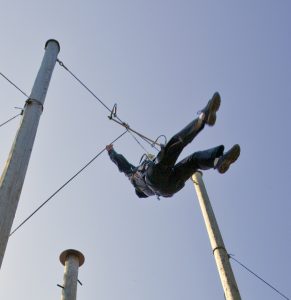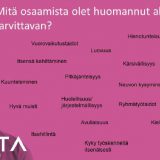From Practical Skills to Professional Competence – the European Setting
What makes a skilled person a professional? How do you become a professional? Who is a professional in a certain field? What is the relation between skills, competences and professionalism?
The title of this blog would seem to claim that there can be a continuum which has practical skills at one end and professional competence at the other. This idea assumes both a “movement” and a “link” or a “relationship” between the two concepts, but it does not explicate the nature, manner or the characteristics of the movement and the link. In addition, Europe is given as the setting – or to be more precise, or maybe less precise, the title evokes the notion of “European” which might be considered a rather vague notion. As the last piece of scene setting, I take the liberty of assuming that all of the above has to do with vocational training and vocational teacher education. But before we move on, let us first look at a couple of definitions:

Definitions of profession (source: Cambridge Dictionary):
“any type of work that needs special training or a particular skill, often one that is respected because it involves a high level of education”
“the people who do a particular type of work, considered as a group”
in addition:
the professions: “jobs that need special training and skill, such as being a doctor or lawyer, but not work in business or industry”
The field of vocational education is vast. There are thousands of vocational job titles to which students are trained across Europe. The recognition of professional qualifications across EU varies, but does already exist to an extent (c.f. BIBB, NOKUT). However, professional areas such as medicine and teaching have been notoriously resistant to cross-border recognition of qualifications. What is the problem?
Professions are typically regulated and defined by both social practises and social institutions. For the purpose of this blog I define social practises to be the more organic processes defining how a professional of a certain field is supposed to act and demonstrate their professionalism. By social institutions I mean laws and other more explicitly articulated demarcations concerning a profession. The process of achieving professional competence involves both social practises and social institutions. Furthermore, professional competence typically also involves practical skills which are put to use in the everyday work of a professional. Is there some truth in assuming that a degree or a qualification in the field of teaching or medicine does not guarantee that the person has adequate competence or the relevant skills? Why do we not trust the competence acquired abroad?
European countries have their own, differing systems for organising vocational education and vocational teacher training. However, it is possible to say that almost every country has a tendency towards formal qualification requirement for vocational teachers. What gives these different applications a setting is the Common European Principles for Teacher Competences and Qualifications (CEDEFOP 2009). The document lists both common principles (a well-qualified profession, a profession placed within the context of lifelong learning, a mobile profession, a profession based on partnerships) and key competences (work with others, work with knowledge, technology and information, work with and in society). These competences are broad and give a lot of scope for further division into more detailed competences within the profession.
In addition to the fact that the elements within a certain competence vary from country to country there is the inevitable issue of what I would call “gate-keeper of culturally bound values” of a profession such as teachers. Even if we know that not all teachers trained in the Finnish – or indeed in any national – system follow the latest learner-centred, digitally enhanced and development oriented pedagogical doctrines, we still want to ensure that an aspiring teacher becomes exposed to those ideas and preferably has to experiment with them at least a little as part of their teacher training. In addition, a teacher who inevitably is embedded in a national culture is still seen as one of the fundamental institutions in forming the nation’s next generation and thus has a role which typically is controlled by state agency, at least to some degree (c.f. Telhaug, Odd Aasen, 2004). Therefore, there are elements in the teaching profession which are so tightly bound with nation state’s structures and it’s ideology of itself that a teacher trained elsewhere must be tried and tested to ensure that s/he possesses or is able to understand the culturally and socially bound competences – let alone the legal obligations which always vary from nation to nation – required to teach in that particular country. Obviously, in this time and age a culturally unified nation state is an illusion, but some illusions linger (c.f. Dale R.2000 for a discussion on the global and local aspects of education). On the other hand, many of our philosophically founded educational principles are not the products of a nation state, but a conglomerate and amalgamation of various influences from various cultures.
In conclusion, practical skills can be demonstrated and more readily put to practice across borders even from and to beyond EU, but professional competence still seems to be a concept which entails the participation of culturally bound processes and institutions in its formation, definition and control. Professional competence is more than a sum of practical skills of an individual.

Kirjoittaja
Kimmo Kuortti
Lehtori
Oulun ammattikorkeakoulu
Ammatillinen opettajakorkeakoulu
List of sources:
BIBB. Federal Institute for Vocational Education and Training. The recognition of professional and vocational qualifications is a success story. https://www.bibb.de/en/34878.php (retrieved: 7.6.2019)
Cambridge Dictionary, https://dictionary.cambridge.org/dictionary/english/profession (retrieved: 5.6. 2019)
CEDEFOP 2009. Common European Principles for Teacher Competences and Qualifications http://www.cedefop.europa.eu/en/news-and-press/news/common-european-principles-teacher-competences-and-qualifications (Retrieved: 5.6.2019)
Dale, R. 2000. Globalization and education: Demonstrating a “common world educational culture” or locating a “globally structured educational agenda”? Educational Theory. Fall 2000, Vol. 50, Issue 4, p427-434. https://web.b.ebscohost.com/ehost/detail/detail?vid=0&sid=b1e65ea4-edc1-45e3-8951-13dd50904647%40sessionmgr101&bdata=JnNpdGU9ZWhvc3QtbGl2ZQ%3d%3d#db=afh&AN=4441915 (retrieved: 11.6.2019)
NOKUT. Recognition of foreign vocational education and training https://www.nokut.no/en/services/recognition-of-foreign-vocational-education-and-training/ (retrieved: 7.6.2019)
Telhaug, A., Mediås, O. & Aasen, P. 2004.From Collectivism to Individualism? Education as Nation Building in a Scandinavian Perspective. Scandinavian Journal of Educational Research. April 2004, Vol. 48, No. 2. https://web.b.ebscohost.com/ehost/pdfviewer/pdfviewer?vid=1&sid=da86c107-a108-4bc7-abb9-dafd07383ffb%40sessionmgr102 (retrieved: 12.6.2019)











